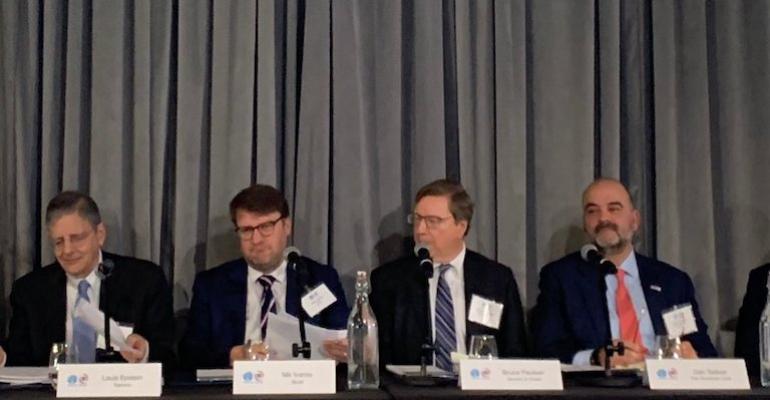The annual joint conference of the Hellenic American Chamber of Commerce, held in conjunction with its Norwegian counterpart, returned to its “in person” format last week with the theme of “Navigating Geopolitical Currents in a Time of Crisis”, The event’s timing came within two days of the new round of G7 led price caps, on refined products originating at Russian facilities, so it was little surprise to learn that sanctions were in focus.
George Tsimis, a lawyer with a practice specialising in resolution of shipping disputes and a self-described history buff, who served as the moderator of the all-important panel discussing sanctions, reminded attendees that the first sanctions were actually a Greek device - The Megarian Decree - in advance of the major conflict between Athens and Megara around 433 BC.
On the panel, Blank Rome’s Matt Thomas, a Partner in the firm’s Washington, DC office, opined that: “More and more, shipping and energy continues to be a central focus of foreign policy initiatives.”
Fellow panel member Bruce Paulsen, Partner at Seward and Kissel in New York, talked about some of the challenges of the new waves of sanctions- launched in February- March 2022, shortly after the Russian invasion of Ukraine, were the extensive designations by the US authorities of Specially Designation Nationals (SDNs), and prohibitions against doing business with them. As an example of the insidious nature of the sanctions, Paulsen offered up the prohibited situation where the investors in a US company, or a financial fund, might be tied to a Russian Oligarch. “You need to know who you are doing business with,” Paulsen said.
In discussing the latest round of sanctions, and the price caps coming from the US and the EU, Thomas contrasted these with previous sanctions targeting Iran and Venezuela, characterizing them as, “much more surgical, and much more multilateral”, He explained that the new price caps, “rather than chopping off trade” had more nuanced objectives than the previous sanctions.
He said that implementation, “has gone relatively smoothly, due to the maturation of the dialogue between OFAC and our industry.” OFAC, within the US Department of the Treasury, is the agency responsible for US implementation of sanctions. Importantly, he described the ability of supply chain participants not directly involved in the buying/selling of the crude oil, or products (this would include shipowners), to get “attestations” that the cargo’s price is beneath the cap.
The P&I Club viewpoint came across in the presentations of panel members Daniel Tadros, the Chief Operating Officer of the Shipowners Claims Bureau, managers of the American Club), and Nikolai Ivanov, who handles Defense matters at the New York office of Skuld.
Tadros, previously in a maritime law practice, said that the American Club, “we are in OFAC’s back yard”, had been dealing with sanctions for possibly longer than the other Clubs. He went on to opine that the United States has taken the back seat on the price caps with Russia, “allowing Europe and the UK to forge ahead with sanctions” and described the result as “some very complex, confusing, and often very contradictory provisions coming out of the European Union especially, though not so much the UK”.
He pointed to some subsequent clarifications but said that confusion still abounds as the P&I Clubs seek to advise their members on compliance. Referring to the industry dialogue with regulators described lengthy days-long discussions with US regulators to explain the various roles in shipping transactions, resulting in a fine-tuning of language, including the definition of “shipper” - the cargo interests, not the ocean carrier.
Skuld’s Ivanov said that when sanctions were imposed, Skuld had to make some difficult decisions, parting company with long-time members. He highlighted the difficulties facing P&I Clubs, “being in between the sanctions authorities, and the practical part of the shipping industry…we act as a buffer between the two and have to effectively police up and down the sanctions chain”.
Copyright © 2024. All rights reserved. Seatrade, a trading name of Informa Markets (UK) Limited.
Add Seatrade Maritime News to your Google News feed.  |

